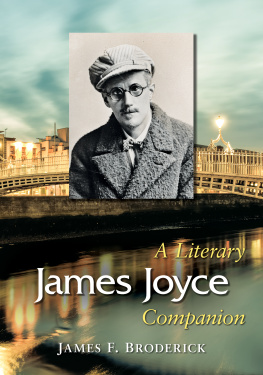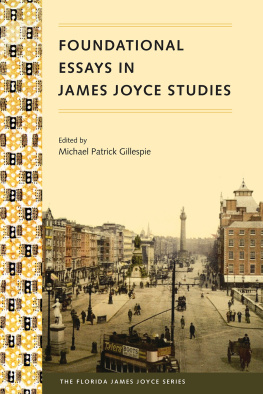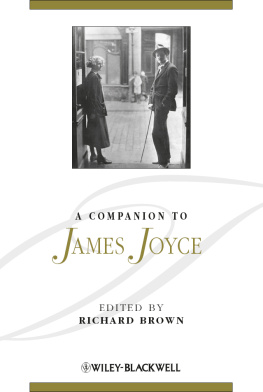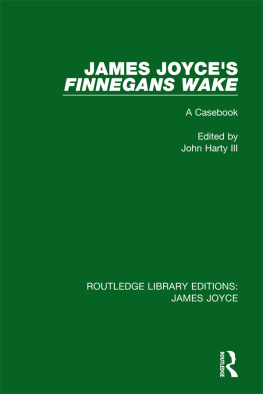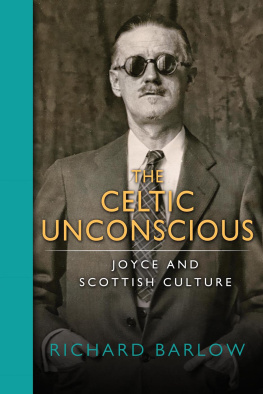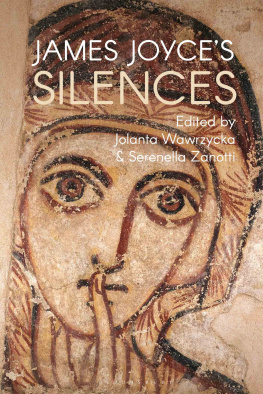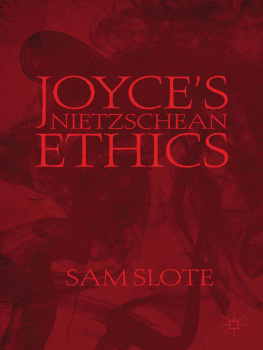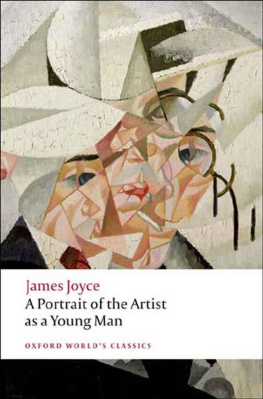James Joyce and Absolute Music
Historicizing Modernism
Series Editors
Matthew Feldman, Professor of Contemporary History, Teesside University, UK; and Erik Tonning, Professor of British Literature and Culture, University of Bergen, Norway
Assistant Editor: David Tucker, Associate Lecturer, Goldsmiths, University of London, UK
Editorial Board
Professor Chris Ackerley, Department of English, University of Otago, New Zealand; Professor Ron Bush, St. Johns College, University of Oxford, UK; Dr. Finn Fordham, Department of English, Royal Holloway, UK; Professor Steven Matthews, Department of English, University of Reading, UK; Dr. Mark Nixon, Department of English, University of Reading, UK; Professor Shane Weller, Reader in Comparative Literature, University of Kent, UK; and Professor Janet Wilson, University of Northampton, UK.
Historicizing Modernism challenges traditional literary interpretations by taking an empirical approach to modernist writing: a direct response to new documentary sources made available over the last decade.
Informed by archival research, and working beyond the usual European/American avant-garde 190045 parameters, this series reassesses established readings of modernist writers by developing fresh views of intellectual contexts and working methods.
Series Titles
Arun Kolatkar and Literary Modernism in India, Laetitia Zecchini
British Literature and Classical Music, David Deutsch
Broadcasting in the Modernist Era, Matthew Feldman, Henry Mead, and Erik Tonning
Charles Henri Ford, Alexander Howard
Ezra Pounds Adams Cantos, David Ten Eyck
Ezra Pounds Eriugena, Mark Byron
Great War Modernisms and The New Age Magazine, Paul Jackson
James Joyce and Absolute Music, Michelle Witen
James Joyce and Catholicism, Chrissie van Mierlo
John Kasper and Ezra Pound, Alec Marsh
Katherine Mansfield and Literary Modernism, Edited by Janet Wilson, Gerri Kimber, and Susan Reid
Late Modernism and The English Intelligencer, Alex Latter
The Life and Work of Thomas MacGreevy, Susan Schreibman
Literary Impressionism, Rebecca Bowler
Modern Manuscripts, Dirk Van Hulle
Modernism at the Microphone, Melissa Dinsman
Reading Mina Loys Autobiographies, Sandeep Parmar
Reframing Yeats, Charles Ivan Armstrong
Samuel Beckett and Arnold Geulincx, David Tucker
Samuel Beckett and The Bible, Iain Bailey
Samuel Beckett and Cinema, Anthony Paraskeva
Samuel Becketts More Pricks Than Kicks, John Pilling
Samuel Becketts German Diaries 19361937, Mark Nixon
T. E. Hulme and the Ideological Politics of Early Modernism, Henry Mead
Virginia Woolfs Late Cultural Criticism, Alice Wood
Upcoming Titles
Chicago and the Making of American Modernism, Michelle E. Moore
Modernist Lives, Claire Battershill
Politics and 1930s Literature, Natasha Peryan
Samuel Beckett and Science, Chris Ackerley
James Joyce and Absolute Music
Michelle Witen
Bloomsbury Academic
An imprint of Bloomsbury Publishing Plc

Contents
This book series is devoted to the analysis of late-nineteenth to twentieth-century literary Modernism within its historical context. Historicizing Modernism thus stresses empirical accuracy and the value of primary sources (such as letters, diaries, notes, drafts, marginalia, or other archival deposits) in developing monographs, scholarly editions, and edited collections on Modernist authors and their texts. This may take a number of forms, such as manuscript study and annotated volumes; archival editions and genetic criticism; as well as mappings of interrelated historical milieus or ideas. To date, no book series has laid claim to this interdisciplinary, source-based territory for modern literature. Correspondingly, two burgeoning subdisciplines of ModernismBeckett studies and Pound studiesfeature heavily as exemplars of the opportunities presented by manuscript research more widely. While an additional range of canonical authors will be covered here, this series also highlights the centrality of supposedly minor or occluded figures, not least in helping to establish broader intellectual genealogies of Modernist writing. Furthermore, while the series will be weighted toward the English-speaking world, studies of non-Anglophone Modernists whose writings are ripe for archivally based exploration shall also be included.
A key aim of such historicizing is to reach beyond the familiar rhetoric of intellectual and artistic autonomy employed by many Modernists and their critical commentators. Such rhetorical moves can and should themselves be historically situated and reintegrated into the complex continuum of individual literary practices. This emphasis upon the contested self-definitions of Modernist writers, thinkers, and critics may, in turn, prompt various reconsiderations of the boundaries delimiting the concept Modernism itself. Similarly, the very notion of historicizing Modernism remains debatable, and this series by no means discourages more theoretically informed approaches. On the contrary, the editors believe that the historical specificity encouraged by Historicizing Modernism may inspire a range of fundamental critiques along the way.
Matthew Feldman
Erik Tonning
The support of so many, at various stages, made this monograph possible. As such, it is my pleasure to single out the following people, though the thanks that follow are only the tip of the iceberg.
First, I would like to thank David Avital, Clara Herberg, and the staff at Bloomsbury (particularly Ian Buck, Lauren Crisp, Laura Ewen, Shereen Muhyeddeen, and Shyam Sunder) for their patience, support and hard work. I would especially like to thank the Historicizing Modernism series editors, Matthew Feldman and Erik Tonning, for including this manuscript among their titles. I am indebted to my anonymous peer reviewers for their encouragement, useful comments, and suggestions; and I am extremely thankful to Derek Gottlieb for indexing this monograph.
I am grateful to the National Library of Ireland for granting permission to reproduce images in this monograph, and for the help of Sandra McDermott and James Harte particularly.
This project would not have been possible without the generosity of the University of Basel, the Freiwilligen Akademischen Gesellschaft Basel, the Department of English at Basel, Exeter College at the University of Oxford, the Social Sciences and Humanities Research Council of Canada, and St Johns College, Oxford. In addition, scholarships from the English Faculty at Oxford, the James Joyce Italian Foundation, the International James Joyce Foundation, and the Zurich James Joyce Foundation during the doctorate enabled interactions with fellow Joyce scholars, which became integral to the development of my ideas.
I owe a particular debt of gratitude to Fritz Senn, who read and provided valuable feedback on my work, and the wonder that is the Zurich James Joyce Foundation (ZJJF). This appreciation also extends to Ruth Frehner, Frances Ilmberger, Ursula Zeller for their encouragement and helpfulness, and to inspiring members of the reading groups such as Sabrina Alonso, Ronald Ewart, Andreas Flueckiger, and Hansruedi Isler.


